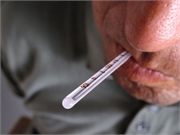- Could Your Grocery Store Meat Be Causing Recurring UTIs?
- Are You Making This Expensive Thermostat Error This Winter?
- Recognizing the Signs of Hypothyroidism
- 10 Strategies to Overcome Insomnia
- Could Artificial Sweeteners Be Aging the Brain Faster?
- Techniques for Soothing Your Nervous System
- Does the Water in Your House Smell Funny? Here’s Why
- Can a Daily Dose of Apple Cider Vinegar Actually Aid Weight Loss?
- 6 Health Beverages That Can Actually Spike Your Blood Sugar
- Treatment Options for Social Anxiety Disorder
The Other Side of COVID-19: Milder Cases, Healthy Recovery

The coronavirus pandemic has caused a worldwide shift in the way people live, placing many in self-imposed exile to prevent the spread of the contagion.
But it’s important to remember that four of every five infected people will have mild symptoms, perhaps so mild as to not be noticeable, experts note.
“About 80% of people get a very mild illness and they recover uneventfully. That’s important to realize,” said Dr. Robert Glatter, an emergency medicine physician with Lenox Hill Hospital in New York City.
Another 15% of people infected with coronavirus have more serious symptoms, and 5% develop life-threatening illness, experts say.
The actor Idris Elba is possibly the most famous mild COVID-19 case in the world. Elba tested positive for coronavirus after being exposed to another infected person, but says he did not have any symptoms.
Still, Elba has asthma, and in a live Twitter chat this week said he’s worried how the virus might affect him in the days ahead.
“Yes, of course I’m worried. I’m worried about having asthma and how that could make things complicated very quickly,” Elba said.
That’s not an insignificant concern. People with a minor case of COVID-19 will wrangle with mild symptoms for a week to 10 days, but their cases can worsen.
Dr. Aaron Glatt, chair of medicine at Mount Sinai South Nassau in New York, said, “We have some general data that suggest people who get symptomatic for a short period of time, it can progress and they can be sicker for a week or even two weeks.”
The way the virus operates within the body gives most people a good chance of developing only mild illness, Glatter said.
The coronavirus tends to shed a lot early in COVID-19 infection, which “is actually good because it produces high levels of [immune system] antibody that are protective,” Glatter said.
Glatter compared COVID-19 to SARS (severe acute respiratory syndrome), which panicked the world in 2002-2003 and had a much higher death rate. That’s because the virus peaked later in the disease, after it had gotten into the lungs.
“When you shed virus at high levels early on, you build antibodies and the antibodies are protective,” Glatter said. “With COVID-19, you shed much earlier in the first days of disease, not when severe lung disease has developed.”
Seattle resident Elizabeth Schneider falls into the 15% of people with more serious symptoms that were still manageable at home.
Schneider suspects she contracted the virus at a house party on Feb. 22, she told CNN. Within three days, she felt fatigued and suffered from body aches and headache. Her temperature rose to as high as 103 degrees.
Schneider tested positive for coronavirus, but recovered after staying home, resting and taking over-the-counter remedies.
“I think the big takeaway I want to tell everyone is: Please don’t panic,” Schneider said. “If you are healthy, if you are younger, if you take good care of yourself when you’re sick, you will recover, I believe. And I’m living proof of that.”
In general, older people are at higher risk for severe symptoms, but that’s not always the case, Glatt said. Chronic illnesses like obesity, lung problems and heart issues could make young people more likely to become sicker.
According to Glatt, “A healthy older person with good lungs and in good shape might be better off than a younger person with a heavy smoking history.”
People who have tested positive for COVID-19 should have two negative tests at least 24 hours apart before they’re considered no longer contagious, he said.
They shouldn’t assume that they now have immunity, however.
Ordinary coronavirus infections that cause the common cold do not produce lasting immunity, said Ira Longini, co-director of the Center for Statistics and Quantitative Infectious Diseases at the Emerging Pathogens Institute at the University of Florida in Gainesville.
“You can be infected over and over, and we really don’t know for this novel coronavirus if that’s also true,” Longini said. “There is some anecdotal evidence already of re-infections, but we really don’t know.”
There’s also some strong concern that minor cases are driving the COVID-19 pandemic, because people aren’t sick enough to know they’re contagious.
About 86% of COVID-19 cases in China went undetected during the two-week ramp up of the epidemic in January, prior to the country implementing travel restrictions, researchers reported this week in the journal Science.
Mild cases are about half as infectious as those with more severe symptoms, said senior researcher Jeffrey Shaman, a professor of environmental health sciences at Columbia University Mailman School of Public Health, in New York City.
But because there are so many more mild cases, they “are driving the spread and growth of the outbreak,” Shaman said.
“The virus thrives off the ability for people to mingle and meet each other,” Shaman said. “Coming into contact unnecessarily at this point is something that people should really consider restricting.”
More information
The U.S. Centers for Disease Control and Prevention has more about COVID-19.
Source: HealthDay
Copyright © 2026 HealthDay. All rights reserved.










